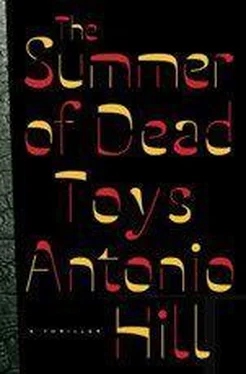Antonio Hill - The Summer of Dead Toys
Здесь есть возможность читать онлайн «Antonio Hill - The Summer of Dead Toys» весь текст электронной книги совершенно бесплатно (целиком полную версию без сокращений). В некоторых случаях можно слушать аудио, скачать через торрент в формате fb2 и присутствует краткое содержание. Жанр: Триллер, на английском языке. Описание произведения, (предисловие) а так же отзывы посетителей доступны на портале библиотеки ЛибКат.
- Название:The Summer of Dead Toys
- Автор:
- Жанр:
- Год:неизвестен
- ISBN:нет данных
- Рейтинг книги:4 / 5. Голосов: 1
-
Избранное:Добавить в избранное
- Отзывы:
-
Ваша оценка:
- 80
- 1
- 2
- 3
- 4
- 5
The Summer of Dead Toys: краткое содержание, описание и аннотация
Предлагаем к чтению аннотацию, описание, краткое содержание или предисловие (зависит от того, что написал сам автор книги «The Summer of Dead Toys»). Если вы не нашли необходимую информацию о книге — напишите в комментариях, мы постараемся отыскать её.
The Summer of Dead Toys — читать онлайн бесплатно полную книгу (весь текст) целиком
Ниже представлен текст книги, разбитый по страницам. Система сохранения места последней прочитанной страницы, позволяет с удобством читать онлайн бесплатно книгу «The Summer of Dead Toys», без необходимости каждый раз заново искать на чём Вы остановились. Поставьте закладку, и сможете в любой момент перейти на страницу, на которой закончили чтение.
Интервал:
Закладка:
“Your husband told me you wished to speak to me.” “Yes. I have something I must tell you.” She spoke slowly, as if it were difficult for her to find the words. “They think Gina killed Marc,” she said, with a note of questioning in her tone. “It’s very early to say something like that.”
Regina moved her head, in a gesture that could express anything. Fatigue, incredulity, acceptance.
“My Gina would never have killed anyone.” The phrase was adequate but it was absent of any emotion. “Whatever they say, I know it.”
“Who says so?”
“Everyone. . I’m certain.”
“People talk for the sake of talking.” Héctor leaned toward her. “I’m interested in what you think.”
“My Gina didn’t kill anyone,” Regina repeated.
“Not even herself?” The question would have been brusque had it been formed in a less friendly tone.
Regina Ballester seemed to ponder her answer seriously.
“I don’t know,” she said finally. She closed her eyes and Héctor thought that he couldn’t continue pressuring her, so he made as if to get up. “Don’t go. I have something to tell you. And I must do it here, just the two of us. I don’t want to cause him any more pain.”
“Who?”
“Salvador,” she answered.
And then, with a trembling voice that Héctor remembered Gina using to answer his questions, Regina began to confess, as if he were a priest, everything that had happened between her and Aleix Rovira.
Aleix had arrived a few minutes after Leire and Héctor, and he now found himself in the lounge, under his father’s severe gaze. Salvador Martí was sitting on the sofa and silence, scarcely broken by Señora Rovira’s whispered questions, reigned over the gathering. There was no sign of Regina, thank God, and Aleix, who didn’t know the police were in the house, told himself she must be resting. When the bell rang again, Gina’s father’s expression was one of such intense irritation that it was Señora Rovira who went to open the door. Her husband took the opportunity to signal to his sons that it was time to go and stood up. Just then Enric Castells and his brother came into the room. Glòria was still at the door, whispering to Señora Rovira. It was clear she was asking about Regina, whom she’d come to see. Aleix said to himself that it was his last chance, and while Enric approached Gina’s father and Fèlix greeted his brother Edu, he slipped between his mother and Glòria, murmuring that he had to go to the bathroom.
He went upstairs and walked rapidly toward Gina’s bedroom. The door was closed and he opened it without thinking. He came to a standstill with surprise on seeing Agent Castro there.
“I’m sorry,” stammered Aleix. “I was looking for the bathroom. .”
Leire’s stare rooted him to the floor.
“Come on, Aleix.” Her tone showed that she didn’t believe a single word. “You’ve been here a million times. . What are you looking for?”
“Nothing.” He smiled at her. He assumed his sad smile, the one he saved for his mother, the nurses at the hospital and for any female in general who might have some authority. Cops are women too, aren’t they? “Well, I wanted to see Gina’s room. Remember her here.”
Sure, thought Leire. But since he was there, she had no intention of letting him go without a bit more.
“When did you last see her?”
“The afternoon you came.”
“You didn’t talk with her again?”
“On Messenger. The same night, I think.”
“Did she seem depressed to you? Sad?”
“Of course she was sad. But I never thought it would come to. . this.”
“No?”
“No.”
“She was really in love with Marc, wasn’t she?”
He looked behind him and closed the door. He sat down on the bed and, involuntarily, his eyes fell on the box of teddies.
“Poor Gina, she kept the stuffed animals in the end.” His smile hadn’t fooled Leire, but she told herself Aleix’s affectionate expression couldn’t be a pose. And if it was, the boy deserved an Oscar.
“Yes,” he finally answered. “She was very much in love with Marc. Since forever.” His smile was genuine this time.
“But he didn’t feel the same?”
Aleix shook his head. She persisted: “He’d met another girl in Dublin, hadn’t he?”
“Yes. A Spanish girl studying there. Gina took it very badly.”
“Badly enough to push him out of the window?”
He shot her an impatient look.
“Gina was drunk that night, Agent. She’d have fallen herself first. . It’s ridiculous to think so.”
The certainty with which he said it disarmed her. It was exactly what Leire thought.
“Then what do you think she was referring to when she wrote this on the computer?” Leire took out her notes and read aloud the last words Gina had left on the screen. She watched Aleix out of the corner of her eye as she read and made out a shadow of guilt in his expression.
“I have no idea,” he said. He rose from the bed and came over to her. “Can I see it?”
Leire showed him the transcript. Aleix’s expression went from surprise to disbelief, and from there to something like fear.
“She wrote it like this? Just as it is here?” he murmured.
“Yes. I took it down exactly as it was written.”
He was about to say something, but stayed silent. And then Dr. Rovira’s voice could be heard, calling him from downstairs.
“I must go.” He stopped at the door. “Do you still want to see me at the station? On Monday?” There was a challenge in his posture.
“Yes.”
“In that case, until Monday.”
He went out quickly, and Leire re-read the note, thoughtfully. Something was eluding them, she was sure. And she was dying to see Salgado to compare impressions.
27
After the previous day’s rain, the sun was taking revenge, beating down mercilessly on the city since the early morning. Even with the window and balcony open it’s too much, thought Carmen, as she wiped the sweat from her forehead with a paper towel. And this from someone who had liked summer since she was a girl, but not this: this fiery sun blazing on to the streets that kept her sweaty and bad-tempered all day long. She poured herself a glass of cold water from the jug and drank it in little sips, carefully, and then turned off the radio that was always in the kitchen. Even music made her feel hot. She should have paid attention to that friendly young man who turned up at her door a few weeks ago to convince her to install air conditioning. Carmen had listened attentively and even arranged another appointment with him, but in the end she hadn’t decided. Modern apparatuses worried her, but just then she scolded herself for not having taken his advice.
The cold water calmed her a little and revived her enough to finish preparing the gazpacho. It was all she could have in summer: a cold glass of gazpacho. When she finished, she put it in the fridge and tidied the kitchen. That’s it, she thought with a touch of apathy. It’s all done. A long, long, muggy day lay before her. She moved to the balcony, but at this hour it was fully exposed to the sun and she held back from leaning out on to the street. How this barrio had changed. . For good, she told herself. She’d never been prone to false nostalgia. No past time was better, although of course it had indeed been more entertaining. That was the worst of old age: these eternal hours not filled by television or magazines. Before she’d at least had Ruth and Guillermo upstairs. That child was an angel. Whenever she thought of him, that little one for whom she’d been a grandmother, Carmen recalled her son. How long had it been since she’d heard from him? Four years? Five? At least he hadn’t come back asking for money: Héctor had taken care of that. Héctor. . Poor Héctor! And it’s not that she thought badly of Ruth, no. Every couple knew what went on inside their marriage and if that girl had left after so many years it was for a reason. But men didn’t know how to be alone. An honest-toGod truth, the same everywhere. In the twentieth century, and in the twenty-first. They didn’t even feed themselves as they should.
Читать дальшеИнтервал:
Закладка:
Похожие книги на «The Summer of Dead Toys»
Представляем Вашему вниманию похожие книги на «The Summer of Dead Toys» списком для выбора. Мы отобрали схожую по названию и смыслу литературу в надежде предоставить читателям больше вариантов отыскать новые, интересные, ещё непрочитанные произведения.
Обсуждение, отзывы о книге «The Summer of Dead Toys» и просто собственные мнения читателей. Оставьте ваши комментарии, напишите, что Вы думаете о произведении, его смысле или главных героях. Укажите что конкретно понравилось, а что нет, и почему Вы так считаете.












